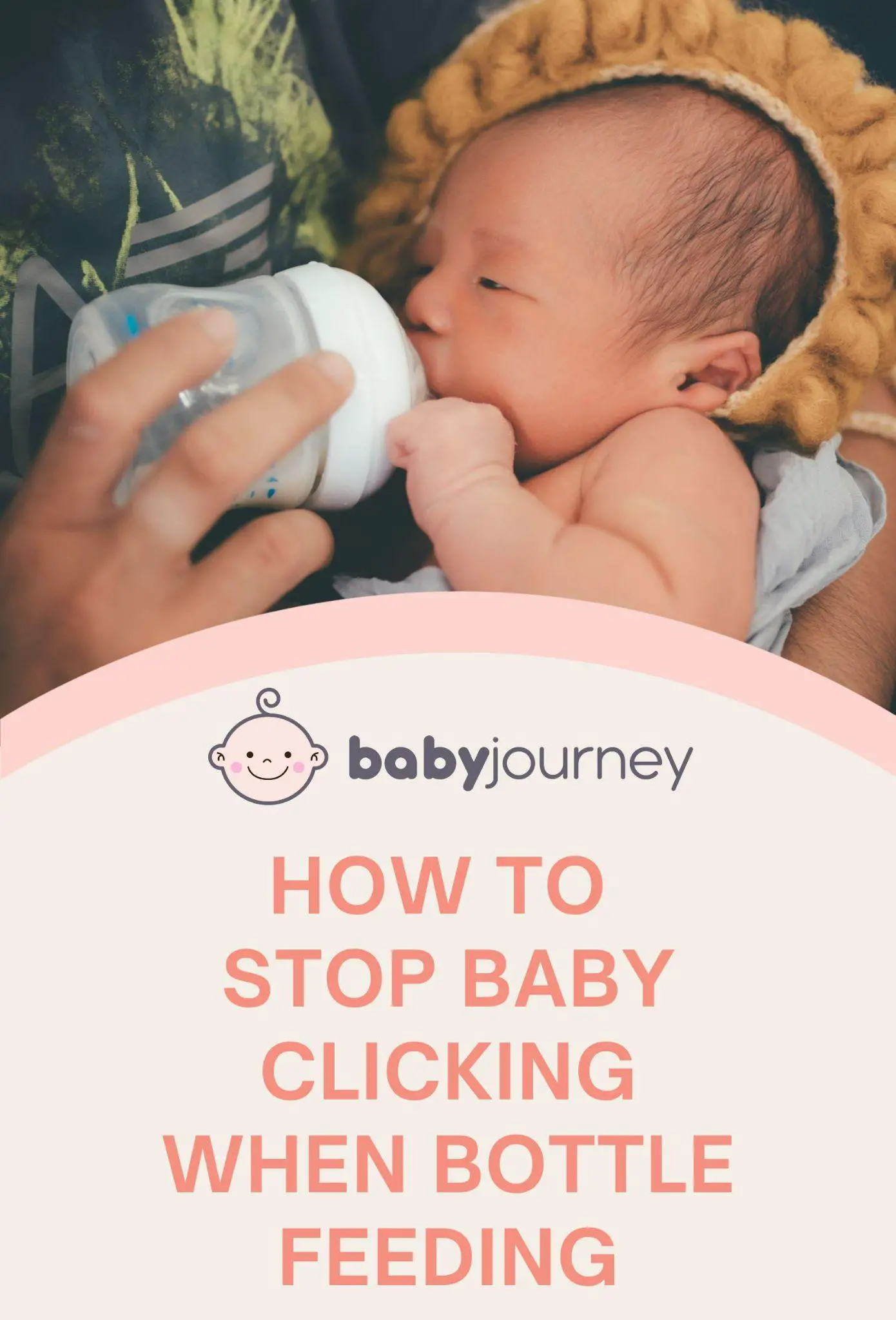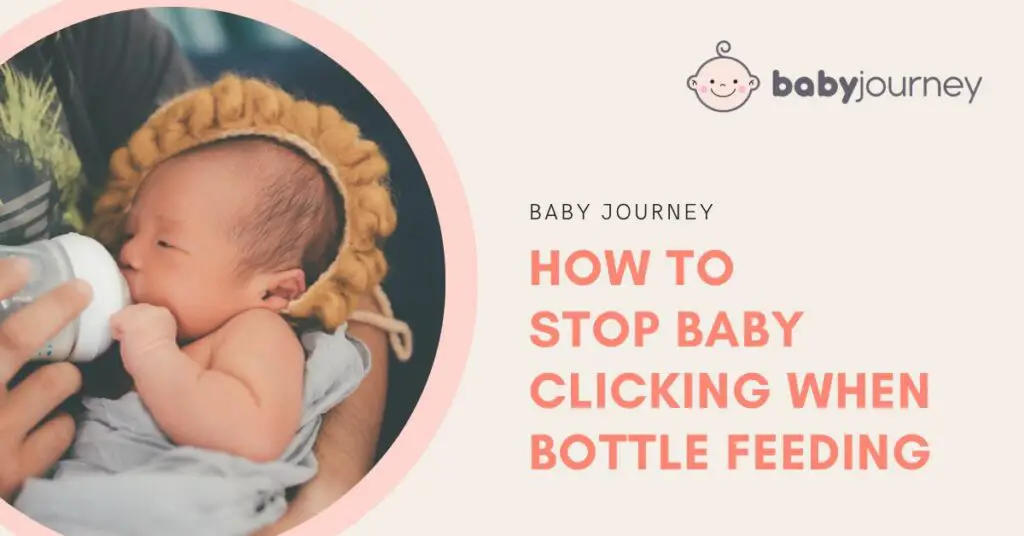Bottle feeding is a common practice among parents to provide their babies with the necessary nutrients. However, some parents may encounter “How to Stop Baby Clicking When Bottle Feeding?”. This clicking sound can be concerning, and parents may wonder what is causing it and how to stop it.
Clicking while bottle feeding can be caused by several reasons, including poor latching, a high flow nipple, or a medical condition such as tongue-tie or cleft lip. It is essential to identify the cause of the clicking sound to address the issue effectively. If left unaddressed, the clicking sound can lead to discomfort for the baby and may affect their feeding habits as well as milk leaking.
Fortunately, there are several techniques parents can use to stop their baby’s lip from clicking while bottle feeding. These techniques include adjusting the baby’s position during feeding, using the correct nipple size, and checking for any medical conditions that may be causing the clicking sound. By following these techniques, parents can ensure their baby is comfortable during feeding time and prevent any potential feeding issues.
Understanding Baby Clicking
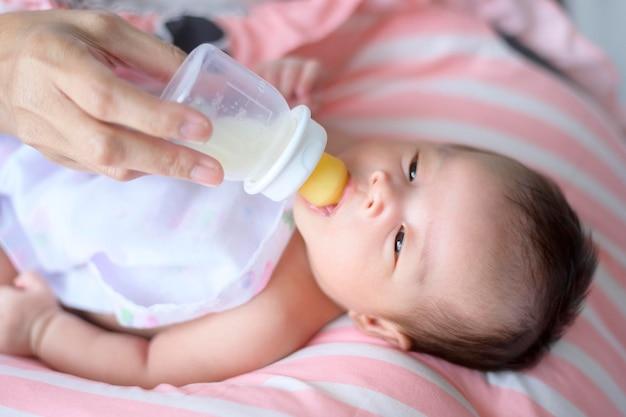
Babies make a wide range of noises while feeding, including clicking sounds. These sounds can be an indication of contentment, discomfort, and even difficulty feeding. In this section, we will discuss what baby clicking is, how to identify it, and the possible causes of clicking sounds while bottle feeding.
Identifying Clicking Sounds
Clicking sounds are usually heard when a baby is bottle-feeding. The sound is produced when the baby’s tongue breaks the seal around the nipple, causing air to enter. The sound can be described as a clicking or smacking noise and is often accompanied by a pause in feeding.
Causes of Clicking Sound While Bottle Feeding
There are several possible causes of clicking sounds while bottle feeding. These include:
- Loss of suction: Clicking sounds are often caused by a loss of suction. This can happen when the baby is not latched onto the bottle nipple correctly or when the bottle nipple is not the right size for the baby’s mouth.
- Tongue-tie: A tongue-tie is a condition where the frenulum (the piece of tissue that connects the tongue to the bottom of the mouth) is too tight. This can make it difficult for the baby to latch onto the bottle nipple and can cause clicking sounds.
- Breast engorgement: Breast engorgement can make it difficult for the baby to latch onto the bottle nipple correctly, which can cause clicking sounds.
- Combination feeding: Combination feeding (feeding the baby both breast milk and formula) can cause clicking sounds as the baby tries to drink milk or formula from the bottle.
Relation Between Clicking and Feeding Issues
Clicking sounds while bottle feeding can be an indication of feeding issues. If the baby is not feeding efficiently, they may not be getting enough milk, which can lead to weight loss and other health problems. Clicking could be just an audible indicator of improper feeding, particularly when infants begin to gain weight or releasing the proper amount of diaper waste.
It is important to identify the cause of clicking sounds and address the problem as soon as possible. This may involve changing the position of the baby during feeding, using a different nipple size, or seeking medical attention for tongue-tie or breast engorgement.
Overall, understanding baby clicking while bottle feeding is important for ensuring that the baby is getting the nutrition they need and avoiding feeding issues. By identifying the cause of clicking sounds and addressing the problem, caregivers can help ensure that the baby is feeding efficiently and comfortably.
Common Feeding Problems and Their Solutions

Bottle-feeding is a common practice for infants, but it can come with challenges. Some babies may make clicking sounds while feeding, which can be a sign of feeding problems. Here are some common feeding problems and their solutions that can help parents address these issues.
Addressing Latch Issues
A proper latch is essential for successful feeding. If the baby is not latching correctly, it can cause discomfort and difficulty in feeding. Some reasons for poor latching include premature birth, tongue-tie, or cleft lip. To address latch issues, parents can try the following:
- Ensure the baby’s mouth is wide open before latching.
- Position the baby’s mouth so that the nipple is aimed towards the roof of the mouth.
- Check that the baby’s lips are flanged outward around the nipple.
Managing Suction Problems
Suction issues can arise if the baby is not creating enough suction to remove milk from the breast or bottle. This can cause clicking sounds to swallow milk or lead to the baby tiring out during feeding. To manage suction problems, parents can try the following:
- Use a nipple with a slower flow rate to help the baby control the flow of milk.
- Try different feeding positions to help the baby create a better seal around the nipple.
- Burp the baby frequently during feeding to prevent the build-up of gas.
Dealing with Feeding Position
The position in which the baby is fed can also play a role in feeding problems. An incorrect feeding position can cause discomfort and lead to clicking sounds. To address feeding position issues, parents can try the following:
- Hold the baby in a semi-upright position during feeding to prevent milk from flowing too quickly.
- Use a nursing pillow to support the baby’s head and neck during feeding.
- Ensure that the baby’s head is higher than their stomach to prevent milk from flowing back into the mouth.
Understanding Nipple Size and Shape
The size and shape of the nipple can also impact feeding. Some babies may prefer a certain nipple size or shape, while others may have difficulty latching onto certain types of nipples. To address nipple size and shape issues, parents can try the following:
- Experiment with different nipple sizes and shapes to find one that works best for the baby.
- Choose a nipple that closely resembles the shape and size of the mother’s nipple.
- Use a nipple that is appropriate for the baby’s age and feeding needs.
Handling Congestion and Ear Infections
Congestion and ear infections can also cause feeding problems. A stuffy nose or ear pain can make it difficult for the baby to create suction or swallow during feeding. To handle nasal congestion and ear infections, parents can try the following:
- Use a saline nasal spray or drops to clear the baby’s nose before feeding.
- Prop the baby’s head up during feeding to help with congestion.
- Consult a doctor if the baby has an ear infection pain, as this may require medical treatment.
By addressing these common feeding problems and their solutions, parents can help their babies feed comfortably and successfully.
Medical Conditions and Clicking
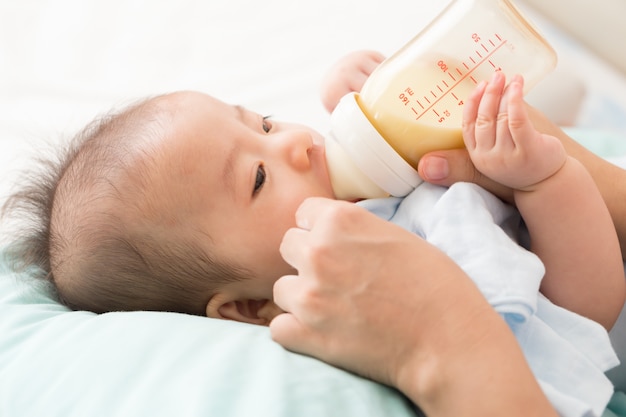
Babies may click while bottle-feeding due to various medical conditions. Understanding these conditions can help parents identify and manage the issue.
Impact of Teething and Thrush
Teething and thrush are two common medical conditions that can cause clicking while bottle-feeding. Teething can cause discomfort, sore mouth and pain in the gums, making it difficult for the baby to latch onto the nipple correctly. Similarly, thrush, a fungal infection in the mouth, can cause discomfort and pain, leading to improper latching and clicking.
Parents can help their babies by offering a teething ring to soothe the gums before feeding or treating thrush with antifungal medication.
Role of Tongue-Tie and Lip Tie
Tongue-tie and lip tie are conditions that occur when the frenulum, the tissue that connects the tongue or lip to the mouth, is too tight. This can restrict the movement of the tongue or lip, making it difficult for the baby to latch onto the nipple correctly and leading to clicking.
Parents can consult with a pediatrician or lactation consultant to diagnose and treat tongue-tie or lip tie. Treatment options may include a frenotomy, a simple surgical procedure to release the frenulum.
Understanding Cleft Lip and Cleft Palate
Cleft lip and cleft palate are birth defects that occur when the tissues in the lip or palate do not fuse together properly during fetal development. These conditions can cause difficulty in latching and sucking, leading to clicking while bottle-feeding.
Parents can work with their pediatrician and a feeding specialist to manage cleft lip and cleft palate. Treatment options may include specialized bottles and nipples, feeding techniques, and surgery to repair the defect.
In summary, medical conditions such as teething, thrush, tongue-tie, lip tie, cleft lip, and cleft palate can cause clicking while bottle-feeding. Parents can work with healthcare professionals to diagnose and manage these conditions to ensure proper feeding and development of their babies.
Professional Help and Guidance
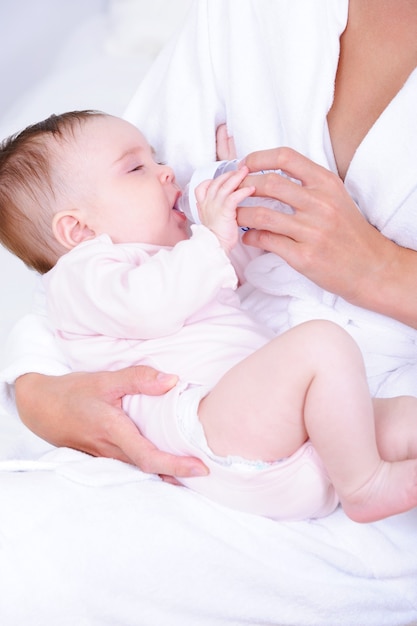
If a parent is struggling to stop their baby from clicking while bottle feeding, they may want to consider seeking professional help and guidance. There are two main professionals that can assist in this situation: pediatricians and lactation consultants.
When to Consult a Pediatrician
A pediatrician is a medical doctor who specializes in the care of infants, children, and adolescents. If a baby is consistently clicking while bottle feeding and the parent is unable to resolve the issue on their own, it may be time to consult a pediatrician. The pediatrician can assess the baby’s health and feeding habits to determine if there are any underlying medical issues that may be causing the clicking sound.
In some cases, the clicking sound may be a symptom of a tongue-tie, which is a condition where the frenulum (the tissue that connects the tongue to the bottom of the baby’s mouth sore back) is too tight, making it difficult for the baby to latch onto the nipple or bottle. A pediatrician can diagnose and treat tongue-tie if necessary.
Role of a Lactation Consultant
A lactation consultant is a professional who specializes in helping mothers and babies with breastfeeding and bottle feeding. They can provide guidance and support to parents who are struggling with feeding issues, including clicking while bottle feeding.
A lactation consultant can help assess the baby’s latch and positioning during feeding, as well as provide tips and techniques to improve the feeding experience for both the baby and parent. They may also recommend different types of bottles or nipples that may be more suitable for the baby’s needs.
Overall, seeking professional help and guidance from a pediatrician or lactation consultant can be a valuable resource for parents who are struggling to stop their baby from clicking while bottle feeding. These professionals can provide expert advice and support to help ensure that the baby is receiving the nutrition they need in a comfortable and safe manner.
Other Relevant Information
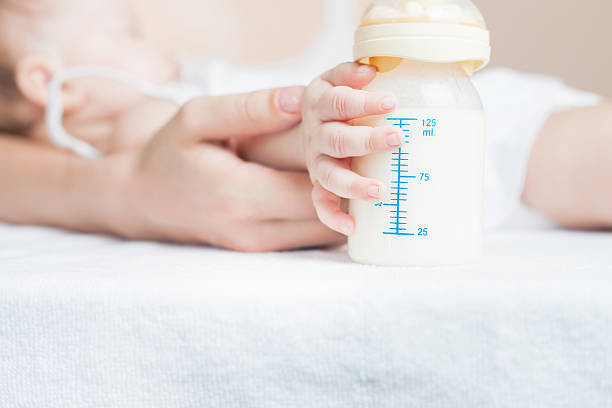
Feeding Time and Baby Communication
Feeding time is an opportunity for the caregiver to bond with the baby and ensure that the baby is getting the necessary nutrients to grow and thrive. It is important to pay attention to the baby’s communication during feeding time, as this can provide valuable information about the baby’s needs.
Babies communicate through a variety of sounds, including clicking, which can indicate discomfort or difficulty feeding. It is important to be attentive to these sounds and adjust the the proper feeding position accordingly. For example, if the baby is clicking while feeding, it may be an indication that the baby is not latching properly or that the nipple flow rate is too fast or slow.
Bottle Positioning and Nipple Flow Rate
Bottle positioning and nipple flow rate are two factors that can contribute to clicking during feeding. It is important to ensure that the bottle is positioned correctly, with the nipple at the baby’s lips and the bottle tilted at a slight angle to allow for proper milk flow. The nipple flow rate should also be appropriate for the baby’s age and feeding ability.
If the baby is clicking while feeding, it may be necessary to adjust the bottle positioning or nipple flow rate. For example, if the nipple flow rate is too fast, the baby may struggle to keep up with the milk flow, leading to clicking or coughing. On the other hand, if the nipple flow rate is too slow, the baby may become frustrated and click in an attempt to increase milk flow.
Overall, paying attention to feeding time and baby communication, as well as bottle positioning and nipple flow rate, can help to less nipple pain, prevent clicking during feeding and ensure that the baby is comfortable and well-fed.
Conclusion
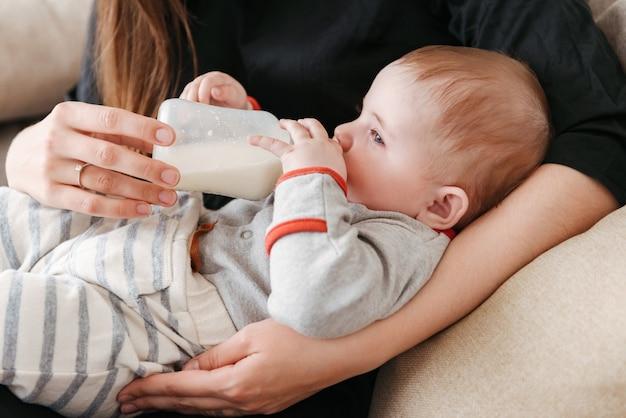
In conclusion, clicking sounds during bottle feeding are common and may indicate a loss of suction or poor latching. It is essential to identify the cause of the clicking sound before attempting to fix it. Some of the common causes of clicking sounds during bottle feeding include:
- Loss of suction
- Tongue-tie
- Incorrect nipple shape
- Poor latching
Parents can take several steps to stop their baby from clicking while bottle feeding. These include:
- Ensuring the baby is well-positioned during feeding
- Using a nipple with a narrow base and gradual slope
- Monitoring the baby’s feeding times and hunger level
- Checking for tongue-tie or other medical conditions
It is important to note that some babies may continue to make clicking sounds during feeding despite the best efforts of their caregivers. In such cases, seeking advice from a pediatrician or lactation consultant may be beneficial.
Overall, parents should be patient and persistent in their efforts to stop their baby making clicking sounds during bottle feeding. With the right techniques and some trial and error, most babies can be trained to feed without making clicking sounds.
Frequently Asked Questions
How can I prevent my baby from making clicking noises while bottle feeding?
To prevent your baby from making clicking noises while bottle feeding, ensure that the bottle nipple is the right size and shape for your baby’s mouth. Additionally, make sure that your baby is latching onto the nipple correctly and that the bottle is positioned at the right angle.
What are some common reasons why babies make clicking noises while bottle feeding?
Babies may make clicking noises while bottle feeding due to a loss of suction, an incorrect latch, or a tongue-tie. Additionally, a baby may make clicking noises if they are hungry or if the milk is flowing too quickly.
Are there any specific bottle types or nipple sizes that can help prevent clicking while bottle feeding?
There are many different types of bottles and nipples on the market, and it can be overwhelming to choose the right one for your baby. Look for bottles and nipples that are designed to prevent air intake and that are the right size and shape for your baby’s mouth.
What techniques can I use to help my baby latch onto the bottle correctly and reduce clicking?
To help your baby latch onto the bottle correctly and reduce clicking, ensure that your baby’s lips are forming a tight seal around the bottle fed nipple. Additionally, hold the bottle at the right angle and try different feeding positions to see what works best for your baby.
Is it normal for babies to make clicking sounds while bottle feeding, or could it be a sign of a problem?
While it is common for babies to make clicking sounds while bottle feeding, it could be a sign of a problem if it is happening frequently or if your baby is having trouble feeding. If you are concerned, speak with your pediatrician.
Are there any medical conditions that could cause a baby to make clicking noises while bottle feeding?
Certain medical conditions, such as a tongue-tie or cleft palate, may cause a baby to make clicking noises while bottle feeding. If you suspect that your baby has a medical condition, speak with your pediatrician.
